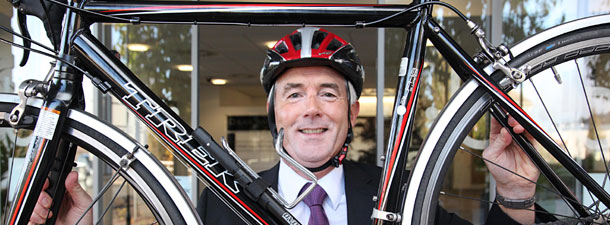The taxman is pedalling furiously in a bid to catch up with cycling’s ‘lycra luvvies’, the Midlands office of national audit, tax and advisory firm Crowe Clark Whitehill has warned.
It follows changes being introduced to salary sacrifice and flexible benefit schemes and means it could be a case of “on yer bike” for workers looking for a loan from their employer.
Paul Edwards (pictured), tax director at Crowe Clark Whitehill, said: “With people very much more conscious of fitness and health these days there has been something of a boom in numbers cycling to work.
“Also the salary sacrifice route for purchasing a bike has proved particularly popular, but the changes could cost employers more than they anticipated.”
The shake-up follows a European Court decision last year in a case against AstraZeneca.
In future, benefits provided in this way will be treated as potentially taxable supplies for VAT purposes. So, VAT will be due on cycle schemes – including any associated equipment – and on subsequent cycle disposals.
Mr Edwards said: “It remains to be seen what effect this imposition will have on cycle purchase schemes.
“It would be an unfortunate own goal if HM Revenue & Customs’ (HMRC) action caused a drop-off in interest and hence set back the government’s campaign to do something about obesity.
“Companies will need to review all existing benefits and consider who should meet any additional costs due – the employer or employees. If necessary, employers may wish to redesign scheme rules.”
To give them time to make the necessary adjustments, HMRC will not require new arrangements to be accounted for until January 1. However, in the interim, it could affect contracts currently in place or which employees are about to sign.
Mr Edwards continued: “Let’s take the example of George who decided to have the loan of a bike retailing at £450, entering the employer’s scheme on June 1.
“His employer worked on the basis he could reclaim the VAT – reducing the cost to £375. This net amount is met under a salary sacrifice contract whereby George agrees to sacrifice £31.25 of his salary each month over a 12-month period. The VAT inclusive cost is £37.50 per month.
“However, George has agreed to a salary sacrifice of only £31.25, so the employer cannot take any more than that without making an unlawful deduction from wages. So, unless he agrees a new salary sacrifice arrangement with George, the employer can only deduct £31.25 and has to suffer the extra £6.25 per month due until the end of the contract.”
And much more than bikes are affected.
VAT will be due on the face value of any vouchers provided. It will not be due on childcare vouchers, although VAT incurred by employers on any administration fee will not be recoverable.
Education is exempt, so providing a member of staff with a free or discounted school place for their child will not attract VAT.
VAT will be due on free or subsidised meals, snacks or drinks where the employee pays for them under salary sacrifice or flexible benefits.
In general cars are not affected; neither are benefits provided to employees free of charge, for example medical insurance.
There is also no mention in HMRC’s guidance of pensions or annual leave, which, said Mr Edwards, conformed to the industry’s understanding that they remain unaffected, as no service is being provided.





















